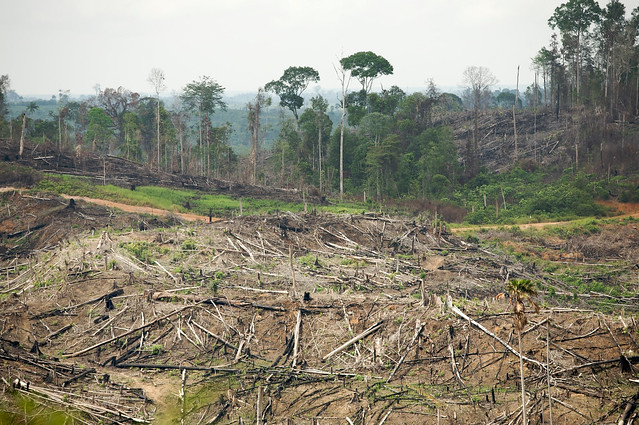The Walt Disney Company announced Thursday morning that it has committed to stop using paper that comes from rainforests. The policy, which also includes the company’s extensive global network of licensees, marks a significant win for environmentalists who have sought to slow logging in rainforests. The agreement came after two years of negotiations with the San Francisco-based Rainforest Action Network.
 Photo by David Gilbert/RANA file photo of clear cutting and burning by Asia Pulp and Paper in a rainforest in Sumatra, Indonesia.
Photo by David Gilbert/RANA file photo of clear cutting and burning by Asia Pulp and Paper in a rainforest in Sumatra, Indonesia.
A Rainforest Action Network investigation found wood fiber linked to the clearing and conversion of
Indonesia’s rainforests in the paper of some of America’s favorite children’s books.
Disney is the largest children’s book publisher in the world and reaches more than 100 million readers. The company’s rainforest commitment will influence the operations of 25,000 factories in more than 100 countries.
“Disney’s new paper policy makes clear that rainforests are more valuable left standing than being pulped for paper,” Rebecca Tarbotton, executive director of Rainforest Action Network, said in a statement.
The company will no longer be sourcing from controversial Indonesian paper giants Asia Pulp and Paper (APP) and Asia Pacific Resources International Holdings (APRIL). Indonesia is the third largest greenhouse gas emitted, due large to the rampant deforestation occurring in the archipelago nation.
“Indonesia has one of the highest rates of deforestation in the world due, in part, to pulp and paper giants like Asia Pulp and Paper and APRIL,” said Lafcadio Cortesi, the Asia Director at Rainforest Action Network. “Disney’s commitment will reduce the demand for paper made at the expense of rainforests while creating incentives for improved forest management and green growth.”
Indonesian rainforests are one of the world’s biodiversity hotspots, home to countless endemic species, including the endangered Sumatran tiger. In addition, rainforests store vast carbon reservoirs in both the vegetation and peat soils. Deforestation causes CO2 release rivaling that of industrial fossil fuel combustion. Paper companies are rapidly deforesting Indonesia, contributing to species loss and climate change. According to scientists from the Center for International Forest Research: "Expansion of pulp processing capacity has occurred much faster than plantation development.” Human rights abuses often accompany logging in Indonesia as armed police and military unlawfully seize land from Indigenous communities for many pulp plantations.
According to Disney, the new Paper Sourcing and Use Policy aims to minimize its overall consumption of paper and maximize its use of recycled content and fiber. Disney will eliminate paper products containing irresponsibly harvested fiber, instead using paper sourced from Forest Stewardship Council-certified operations.
In a statement released this morning, Disney boasted that the new policy was part of a broader commitment to the environment. The Disney Worldwide Conservation Fund has invested in conservation projects around the world for two decades, including more than 70 projects in Indonesian rainforests and more than $27 million in forest carbon projects in the United States, Peru, Brazil, Democratic Republic of Congo and China. “The rate of depletion of our planet’s forests is staggering and it’s important that we focus significant resources on their protection,” said Beth Stevens, senior vice president, Environmental Affairs, The Walt Disney Company.
“The world’s forests are facing multiple pressures. Disney’s actions to better understand its paper usage and supply chain send a positive signal that the company recognizes the seriousness of this issue,” says Ruth Nogueron of the World Resources Institute. “This is a welcome step that reflects Disney’s commitment to support responsible forest management.”
Today’s announcement by Disney is the latest in a string of environmental victories involving logging in Indonesia. Last October, Greenpeace inked an agreement with toy company Mattel to stop buying packaging material from Asia Pulp and Paper. Also last fall, the Girl Scouts said it would investigate how to use less Indonesian palm oil in its iconic cookies after two scouts, Brower Youth Award winners Rhianon Tomtishen and Madison Vorva, ran a national campaign focused on the loss of orangutan habitat.
Disney will join the ranks of nine top US publishers that have made similar sustainable rainforest commitments, including Scholastic, Hachette, Pearson/Penguin, Candlewick Press, Houghton Mifflin Harcourt, Macmillan, Random House, and Simon & Schuster.
We don’t have a paywall because, as a nonprofit publication, our mission is to inform, educate and inspire action to protect our living world. Which is why we rely on readers like you for support. If you believe in the work we do, please consider making a tax-deductible year-end donation to our Green Journalism Fund.
Donate